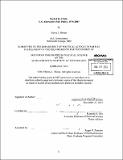| dc.contributor.advisor | Kenneth A. Oye. | en_US |
| dc.contributor.author | Breetz, Hanna L | en_US |
| dc.contributor.other | Massachusetts Institute of Technology. Department of Political Science. | en_US |
| dc.coverage.spatial | n-us--- | en_US |
| dc.date.accessioned | 2014-01-09T19:52:00Z | |
| dc.date.available | 2014-01-09T19:52:00Z | |
| dc.date.issued | 2013 | en_US |
| dc.identifier.uri | http://hdl.handle.net/1721.1/83759 | |
| dc.description | Thesis (Ph. D.)--Massachusetts Institute of Technology, Dept. of Political Science, 2013. | en_US |
| dc.description | Cataloged from PDF version of thesis. | en_US |
| dc.description | Includes bibliographical references (pages 296-310). | en_US |
| dc.description.abstract | This dissertation investigates the policy-making process that led to three "crash programs" for alternative fuels after energy shocks in the 1970s and early 2000s: (1) the proposed Energy Independence Authority in 1975-1976, (2) the Synthetic Fuels Corporation in 1979-1980, and (3) the revised Renewable Fuel Standard in 2007. These were massively ambitious programs, with enormous budgets and unachievable technological goals. What makes them truly puzzling, though, is that they were major policies that emerged without major advocates. Although various interest groups and constituencies supported the development of alternative fuels, neither the powerful industry lobbies (oil, coal, corn, ethanol) nor the public interest groups (environment) had previously advocated for interventions of this scope and scale. This presents a fundamental empirical puzzle for public policy scholars, as it contradicts our understanding of the drivers of policy change. Typically, the policy process literature portrays radical policy change as resulting from the strategic efforts of interest or advocacy groups during a window of opportunity. Here, however, radical policy change occurred in the absence of lobbying or advocacy efforts. What explains this phenomenon? How do we account for the creation of these programs? What conditions and sequence of decision-making led to these policy outcomes? This dissertation develops an alternative model of "politician-driven policymaking." Public alarm over a deepening national crisis is the catalyst for this process. It gives rise to two coupled mechanisms: "bidding up," in which the President and Congress compete for leadership during the crisis, and "signing on," in which interest groups and minority Congressional groups bargain and often bandwagon with the legislative proposals. | en_US |
| dc.description.statementofresponsibility | by Hanna L. Breetz. | en_US |
| dc.format.extent | 310 pages . | en_US |
| dc.language.iso | eng | en_US |
| dc.publisher | Massachusetts Institute of Technology | en_US |
| dc.rights | M.I.T. theses are protected by
copyright. They may be viewed from this source for any purpose, but
reproduction or distribution in any format is prohibited without written
permission. See provided URL for inquiries about permission. | en_US |
| dc.rights.uri | http://dspace.mit.edu/handle/1721.1/7582 | en_US |
| dc.subject | Political Science. | en_US |
| dc.title | Fueled by crisis : U.S. alternative fuel policy, 1975-2007 | en_US |
| dc.title.alternative | U.S. alternative fuel policy, 1975-2007 | en_US |
| dc.type | Thesis | en_US |
| dc.description.degree | Ph.D. | en_US |
| dc.contributor.department | Massachusetts Institute of Technology. Department of Political Science | |
| dc.identifier.oclc | 864823449 | en_US |
